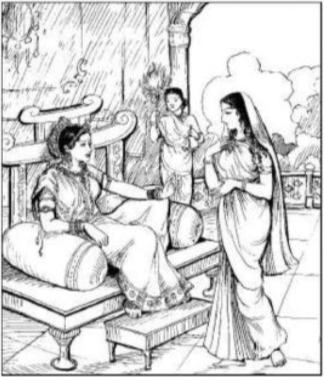Bhagwan Parashuram in Hastinapura Assembly
Following Shrikrishna’s powerful plea for peace, the assembly was stunned into silence, overwhelmed by the depth and gravity of his words. No one dared to respond—until the great sage-warrior Parashurama (Rama, son of Jamadagni) addressed Duryodhana with a parable meant to teach humility and righteousness.
Following Shrikrishna’s powerful plea for peace, the assembly was stunned into silence, overwhelmed by the depth and gravity of his words. No one dared to respond—until the great sage-warrior Parashurama (Rama, son of Jamadagni) addressed Duryodhana with a parable meant to teach humility and righteousness.

Bhagwan Parashurama recounted the story of King Dambhodbhava, a mighty and proud monarch who once ruled the entire earth. Arrogant and boastful, he routinely challenged all classes of people—Brahmanas, Kshatriyas, and others—asking if anyone could equal him in battle.
Despite warnings from wise Brahmanas to abandon his pride, he persisted. Eventually, they told him of two unmatched sages—Nara and Narayana—practicing penance in the Gandhamadana mountains.
Despite warnings from wise Brahmanas to abandon his pride, he persisted. Eventually, they told him of two unmatched sages—Nara and Narayana—practicing penance in the Gandhamadana mountains.
Driven by arrogance, Dambhodbhava marched there with his army to challenge them. The sages received him humbly and declined to fight, explaining their retreat was free of anger and weapons. Still, the king insisted. In response, Nara picked up a handful of grass, transformed them into divine weapons, and used them to defeat the king’s massive army, blinding and disfiguring the soldiers with magical blades of grass.
Humbled and terrified, the king fell at Nara’s feet. The sage forgave him and instructed him to live virtuously—obey Brahmanas, renounce pride and greed, and serve his people with humility. The king returned to his kingdom a changed man, devoted to dharma (righteousness).
Humbled and terrified, the king fell at Nara’s feet. The sage forgave him and instructed him to live virtuously—obey Brahmanas, renounce pride and greed, and serve his people with humility. The king returned to his kingdom a changed man, devoted to dharma (righteousness).
Bhagwan Parashurama used this tale to warn Duryodhana: just as Dambhodbhava had been vanquished by humility and power combined, Duryodhana should beware of Arjuna (Nara) and Shrikrishna (Narayana)—the same divine pair reborn.
He described Arjuna as unbeatable, wielding powerful divine weapons like Gandiva and assisted by Shrikrishna, who is the Lord of the Universe and beyond defeat.
These weapons, he warned, symbolize and conquer human vices—lust, wrath, greed, pride, and envy—and inflict chaos on those who oppose them. Men struck by these forces are rendered senseless, humiliated, or destroyed.
He described Arjuna as unbeatable, wielding powerful divine weapons like Gandiva and assisted by Shrikrishna, who is the Lord of the Universe and beyond defeat.
These weapons, he warned, symbolize and conquer human vices—lust, wrath, greed, pride, and envy—and inflict chaos on those who oppose them. Men struck by these forces are rendered senseless, humiliated, or destroyed.
Bhagwan Parashurama urged Duryodhana to abandon his pride and make peace with the Pandavas, emphasizing that Arjuna and Krishna were divine and invincible. War would lead to ruin, not glory. The Kuru lineage was noble and should remain honored.
If Duryodhana truly valued his family and heritage, he would seek reconciliation, not conflict.
If Duryodhana truly valued his family and heritage, he would seek reconciliation, not conflict.
This speech of Bhagwan Parashuram was followed by Rishi Kanva narrating the story Matali's quest for his son-in-law and how nobody should be over-confident about their power.
We will cover the story narrated by Kanva rishi in our next thread. Follow @mysutradhar to never miss these posts.
We will cover the story narrated by Kanva rishi in our next thread. Follow @mysutradhar to never miss these posts.
• • •
Missing some Tweet in this thread? You can try to
force a refresh













